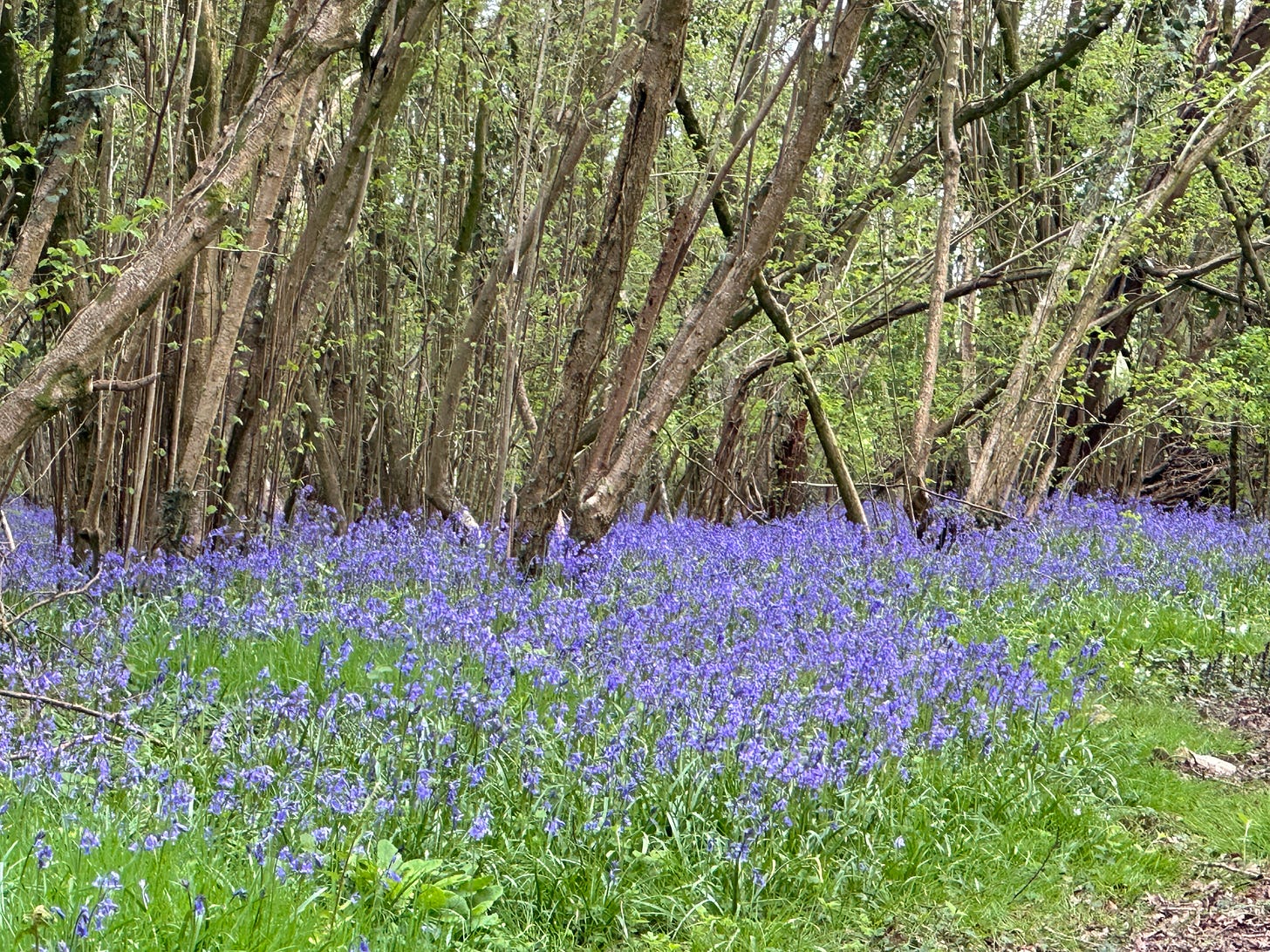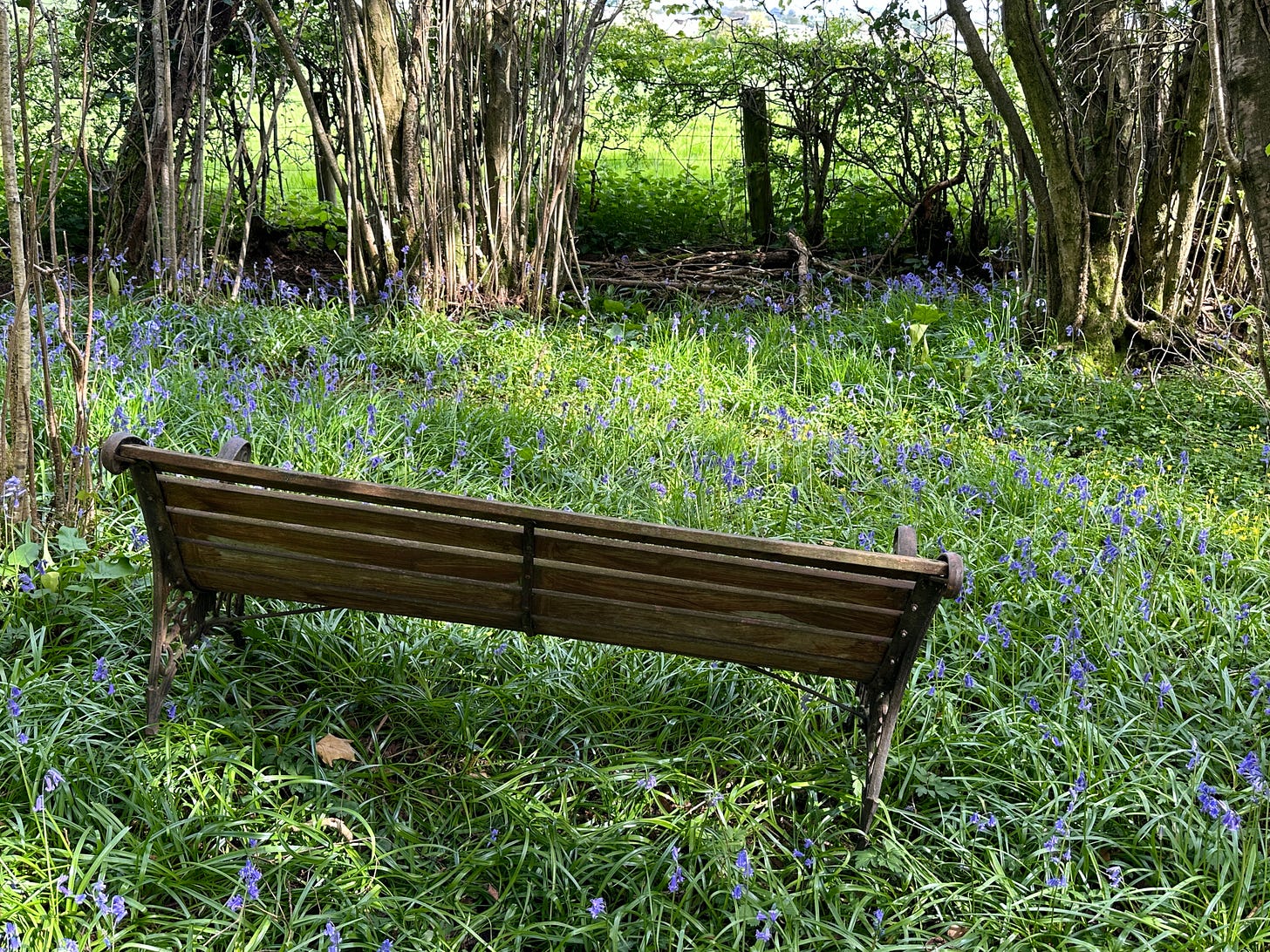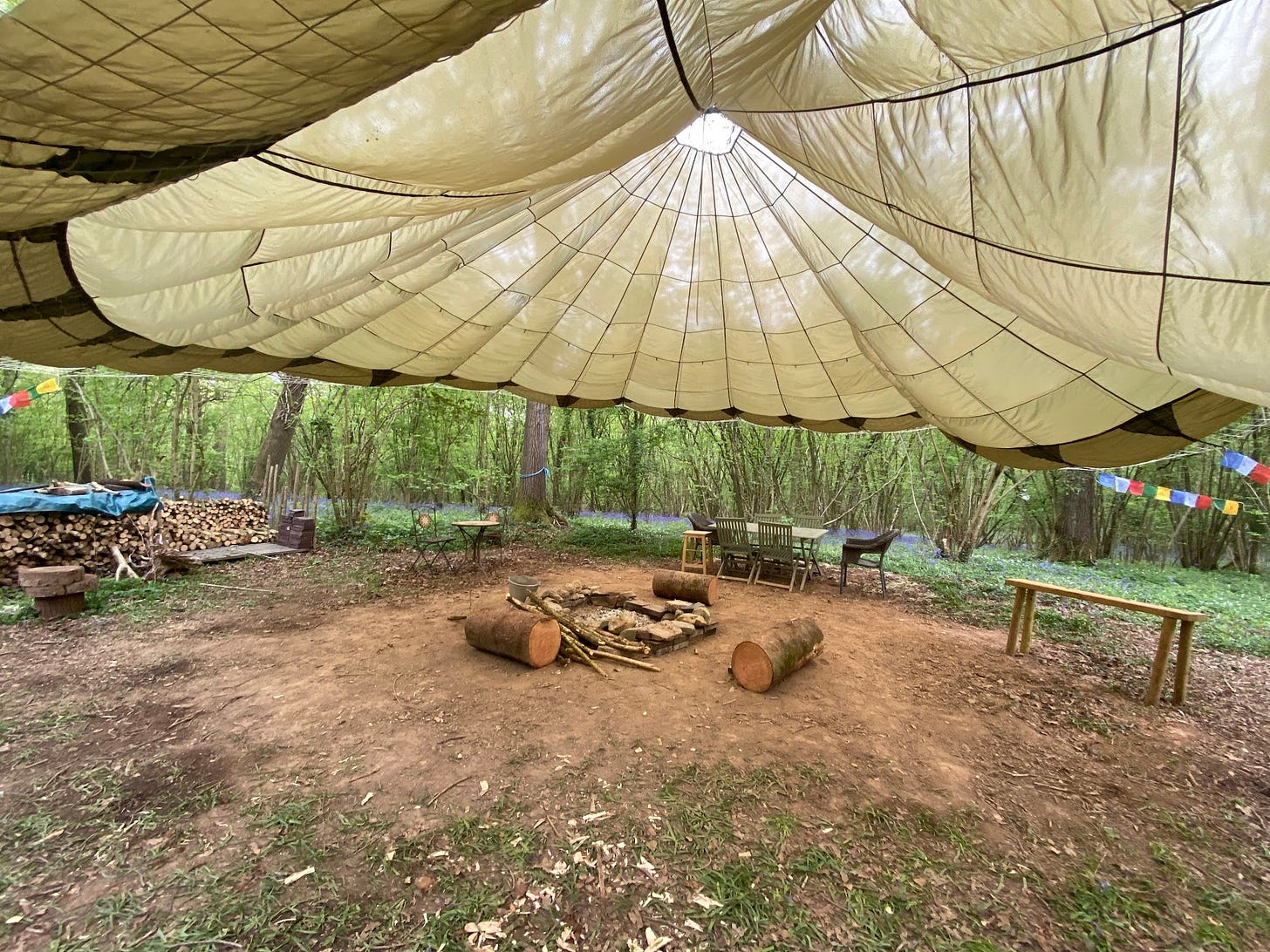Welcome to new subscribers, and readers. I write around retirement, later life, nature, wisdom and include relevant research. If you find this article interesting, I would love you to become a subscriber. Everything I write is free to read, but it is so satisfying to know people choose to allow my writing to come to their inbox. Thanks in advance.
It was during lockdown that I realised going to public open spaces was not enough. I wanted to be alone with trees.
I’d walk in my local park or go to one of the hills on the Cotswold escarpment and there were people. I wasn’t engaging in conversation but I was aware of their presence. I wanted a more quiet experience.
I’d first appreciated this when I did a Vision Quest. After 3-4 days preparation I then spent 4 days and nights alone – no tent, just a tarp, no food but lots of water. No mobile phone or watch, but pens and paper and my knife.
I appreciated the quiet. A time to look at the trees and plants. To follow the path of a spider, or ant. To watch how the wind moved the branches of trees. To listen to the sound of the different birds, and the wind.
And I gained inspiration.
I had time to think. Time to allow some sense to come from my jumble of thoughts. To think about my future, to reflect on my past. To have clarity of thought.
I also wrote poetry, straight off. The beauty of time without other distractions.
A year on from my vision quest I met someone who shared my love of nature and within 6 months we had bought a wood together. As we walked around, I got a wonderful sense of home. I touched the trees and they welcomed me. Within a month it was ours, and has been for over 3 years.
The magic of a private wood.
Buying a wood in February I could follow it through the seasons and what a wonderful time to start. From the wood anemones, the occasional dog violet, through garlic mustard and ransom (wild garlic) to the swathes of bluebells into dog mercury, lords and ladies (cuckoo pint) and more. Alongside listening to bird song. We have even heard, and seen a nightingale in our wood.
We put up trail cams to capture wild life; so many deer – roe and muntjac; hares and foxes and the pesky squirrels. A couple of times I caught an owl, sitting motionless as it waited to swoop on a mouse. Plenty of birds too. Reviewing the trailcam footage became my main hobby. Putting the highlights together with music and sharing them on FaceBook and YouTube.
With it being my land, it means I have a deep connection, I can see the changes as the wind brings down branches and I can spot the tracks of deer.
I realise just how lucky I am to have had the money to buy a wood around 30 minutes from where I live. But it is also hard work, the vision of lazing in the hammock at weekends is too often put to one side as we need to get the chainsaw and chipper out and undertake woodland management tasks. But in the week, I go to the wood alone and take time just to be. I have a bench looking out onto fields and this is a lovely place to dream.
What is it about later life that means that we crave our time alone?
Through my academic studies into rethinking retirement and meaningful ageing I’ve read about the importance of both solitude and nature connection.
Connecting to nature can help reduce feeling of loneliness. It reminds us that we are part of an ecosystem where we are related to other living things and the wider universe. It’s often in nature that we can experience awe.
I believe that when we are quiet, especially in nature that we can get in touch with our hidden thoughts. And of course, this is not just for those of us in later life, but relevant for people of all ages. There is an increase in forest schools, such as to be found in Scandinavia. Increased exposure to nature can help reduce crime and aggression, and lead to better community cohesion. (REF 1)
It is 2 hours a week out in the natural environment that helps give people a stronger sense of well-being. This figure is based on research by Matthew White and others (REF 2). The 2-hour time is important, spend just one minute less than this and it didn’t have any effect on peoples’ health. The research also found that it doesn’t have to be all in one go, but can be spread over a week.
As I reviewed some academic papers and articles, I read that there is too much focus on experiencing nature visually, “We need to deepen the forms of interaction with nature and make it more immersive.”
This is where forest bathing helps, and paying attention to all our senses. It’s not just what we see, but also listening to the sounds, and touch. Go hug a tree and notice the pattern of the bark. Also feel the wind and sun on your body. Going barefoot literally grounds you.
Silence
When you can be alone in nature you get the benefits of silence, but we can experience silence at other times too. We need to make space for it in our life. I love to wake early and sit on my balcony with my first hot drink of the day. I’m up early so it’s before cars start driving by.
It’s good to be alone with our thoughts, especially for those of us who love to write. Let me end with this quote from a Harvard Business Review article (REF 3)
“Taking time for silence restores the nervous system, helps sustain energy, and conditions our minds to be more adaptive and responsive. … Silence is associated with the development of new cells in the hippocampus, the key brain region associated with learning and memory. But cultivating silence isn’t just about getting respite from the distractions of office chatter or tweets. Real sustained silence, the kind that facilitates clear and creative thinking, quiets inner chatter as well as outer.”
The article suggests 4 ways to get some quiet time
1. To punctuate meetings with 5 minutes of quiet time
2. Take a silent afternoon in nature
3. Go on a media fast – turning off emails, and social media
4. Try a meditation retreat
I’d love to know about your experience of spending time quietly in nature, do share below.
1.. https://academic.oup.com/bioscience/article/65/12/1141/223866
2.. https://www.nature.com/articles/s41598-019-44097-3
3.. https://hbr.org/2017/03/the-busier-you-are-the-more-you-need-quiet-time








Thank you. I know this and seeing silent time prescribed, reading health data, always helps. I love your photos. Off to the redwoods!